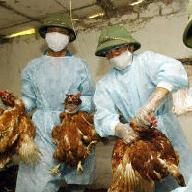Human-to-human AI transmission possible in latest case

The World Health Organisation has reported that human-to-human transmission of the avian influenza virus may have taken place in the most recently confirmed case in Indonesia.
A 27-year-old man, who had mild symptoms and recovered from the avian influenza infection, reported no contact with diseased or dead poultry, but had extended contact with his 15-year-old sister, who was confirmed as having the disease.
The girl developed symptoms on 17 May 2006 and was subsequently confirmed to be H5N1 infected. Her brother spent six days caring for her during her hospital stay. The brother developed mild symptoms of cough and abdominal discomfort, with no fever, on 28 May 2006.
Despite his mild and atypical symptoms, the brother was tested as part of the Ministry of Health’s protocol for contact tracing and the management of any contacts with symptoms. He was given a five-day course of oseltamivir beginning on 1 June and was placed in voluntary isolation pending recovery.
Initial tests of samples collected from the 27-year-old male were negative for H5N1 infection. In August, however, follow-up testing of paired-serum samples found a fourfold rise in neutralisation antibody titer for H5N1, a test result which meets the WHO criteria for laboratory confirmation.
The 27-year-old male reported no contact with diseased or dead poultry in the days prior to symptom onset as he spent most of his time at the hospital. The investigation determined that he had exposure to his sister during her hospital stay, and that human-to-human transmission could not be ruled out as the source of his infection.
The retrospectively confirmed cases bring the total in Indonesia to 65. Of these cases, 49 have been fatal.
The retrospectively confirmed cases bring the total in Indonesia to 65. Of these cases, 49 have been fatal.













